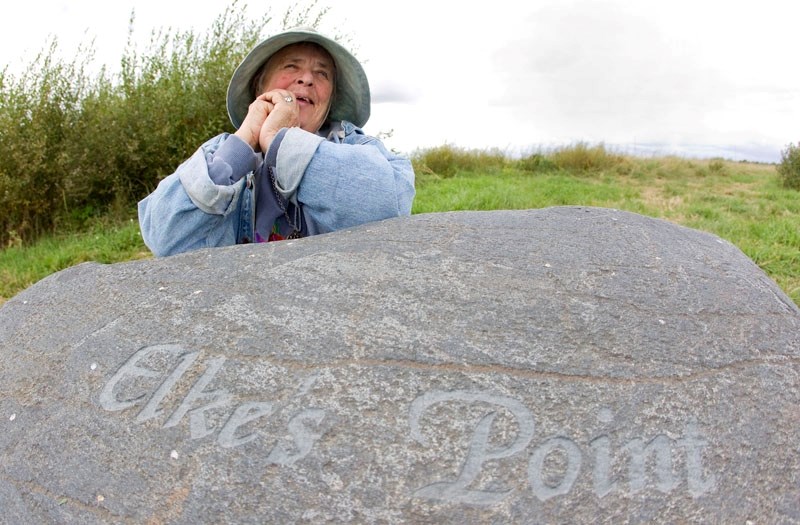You don't have to agree with Elke, but you have to admit, she has a Point.
Friends, family and dignitaries will gather at Riel Pond this Thursday to dedicate its peninsula to St. Albert resident Elke Blodgett. The peninsula will henceforth be known as Elke's Point.
A world-renowned artist, Blodgett will be honoured this week for her many years as an environmental activist in and around St. Albert.
Blodgett has done much to teach residents about the importance of lakes and wetlands, says Pat Collins, president of the Big Lake Environment Support Society (BLESS), and well deserves this honour. "We've been very lucky to have her."
From war to wetlands
Blodgett, 75, sat down for an interview with the Gazette at Elke's Point earlier this month. The spot has been marked with a big rock, on which the words "Elke's Point" are faintly engraved.
She didn't want a bench or a plaque or anything that would draw attention to the spot, she explains. "It's an erratic," she says of the rock, "a glacial erratic. It fits naturally."
The rock, perhaps intentionally, is close to the site of many of her past battles. Stand by it, and you have a clear view of Lois Hole Centennial Provincial Park, which Blodgett lobbied for, as well as the power lines she has railed against. Turn east, and you can spy the table where she collected thousands of names for a petition against what is now Ray Gibbon Drive. Peer beyond that, and you spy the leaky landfills she took the city to court over in 2004.
She still comes down to this area almost every day, she says. "It's magnetic, this whole area. It draws me."
Born in Leipzig, Germany, Blodgett grew up during the worst days of the Second World War, spending her nights in bomb shelters that shook despite their metre-thick walls. "It was an absolute nightmare."
But the terror of war also introduced her to the beauty of nature. Blodgett recalls being fascinated by the shrapnel left by Allied bombs in the streets — so much like frozen lightning — and the pink blossoms floating in the watery crater that used to be her home's apple tree. "The beauty of the apple blossoms floating in there was just overwhelming."
It also gave her life-saving lessons about nature, many of which came from her father, George Krüger. An engineer, Krüger showed his family how to harvest wild mushrooms and berries so they could survive. "Without clean water, we are nothing," was the message he drilled into a young Blodgett.
Blodgett went on to marry Edward Dickinson (E.D.) Blodgett in 1960 and found work as a translator (she speaks four languages). They landed in St. Albert six years later and soon fell in love with Big Lake, taking their three kids on frequent trips there.
Blodgett says it was the sight of a dead blue heron on a power line in the late 1970s that triggered her move into environmentalism. "I wanted to be able to go swimming in this river," she says, and she became irked that she couldn't. Meanwhile, the city had begun an environmental impact assessment of the proposed western bypass, one harshly criticized by BLESS.
When council voted 4-3 to approve the bypass in 1997, Blodgett and Klaus Nenn started a petition against it that collected some 10,125 names.
It was her proudest moment, she says. "People would literally line up at the picnic table over there to sign my petition," she says. The petition pushed council to back off on the road for four years.
Y'know, she has a point…
Today, Blodgett draws great respect from not only environmentalists but also the officials she so frequently goes after.
That's because of her approach, says former mayor Richard Plain, who found something of an arch-nemesis in Blodgett during the west bypass debate. Instead of chaining herself to a door, she proved her points with extensive research. "I always respected Elke's input," he says. "It wasn't just someone having a rant at council. A lot of times she had some legitimate points that had to be met."
When AltaLink environmental advisor Nikki Heck read of Blodgett's concerns about birds hitting the Big Lake power line, she says she called her to find out more details. "She was bringing an issue forward that we needed to know about and address." Talks with Blodgett and others led the company to put reflectors on the line and later to propose moving it. "Her persistence in this case probably helped save a lot of birds up there."
Blodgett's greatest legacy is the informed citizenry she helped create, Plain says. "It's one of the things that makes St. Albert, St. Albert."
Blodgett thanked the many friends, scientists and professionals who have helped her in her efforts over the years, and says she's glad to have Big Lake, the BLESS platform and Lois Hole park as neighbours. "You just have to get rid of the power poles," she adds. "We're working on that."
The naming ceremony is at 6 p.m. at Riel Pond Thursday. Call Dawn at 780-459-1500 ext. 0 for details.




